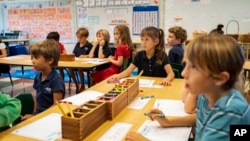Children take their places at folding tables on a church patio several miles from where their school burned down. Plastic tubs hold brand new textbooks quickly shipped from a publisher. Recess is on the resort golf course across the street.
The wind-driven wildfire that leveled the historic Maui town of Lahaina this summer displaced many pupils not just from their homes, but from their schools, forcing their families and education officials to scramble to find other ways to teach them.
Now, more than two months after the Aug. 8 wildfire killed at least 98 people, the three public schools that survived are set to reopen this week, posing an emotional crossroads for traumatized children and their families as they decide whether to go back to those campuses or continue at the other schools that took them in.
Some parents said they won't send their children back because they worry the fire left toxins behind, despite assurances from education officials that the campuses are safe.
"I'm feeling optimistic about it and grateful we get to go back," said Cailee Cuaresma, a 10th-grader at Lahainaluna High School. "I'm grateful our school is still standing."
For the past month, Cuaresma has attended classes at the makeshift campus of Sacred Hearts School, a Catholic school founded in 1862. Most of the school burned down, but its leaders quickly got classes up and running at Sacred Hearts Mission Church 10 miles (16 kilometers) away.
Sacred Hearts and other private schools across the state took in displaced public school students, such as Cuaresma, while offering a year of free tuition. Other students bused more than 45 minutes away to public schools on the other side of Maui or opted for remote classes.
On a recent school day at Sacred Hearts' temporary site, teachers moved students between pockets of shade to keep them out of the relentless Lahaina sun. Principal Tonata Lolesio told students assembled on cushioned pews in a chapel that it might be two years before they can return to a rebuilt school.
"Pray that it can be sooner," she said.
Meanwhile, space limitations require students to attend classes on staggered days. Workers have been readying an adjacent lawn for tents allowing at least the younger children to attend school daily.
Cuaresma sat with a group of younger students petting a golden retriever comfort dog brought in by Assistance Dogs of Hawaii. Her home survived the fire, but her dad only recently got his job back at a hotel. Being at Sacred Hearts was a good opportunity because the work was challenging, she said.
One public school in Lahaina, King Kamehameha III Elementary, was destroyed. Pupils from there will share space with Princess Nāhiʻenaʻena Elementary, which was closed for post-fire cleaning along with Lahainaluna High and Lahaina Intermediate.
The schools are just blocks away from piles of potentially dangerous ash, prompting concerns from parents, but education officials have said air-quality tests show it is safe to reopen.
"He is not going to be stepping one foot back there," said Tiffany Teruya, the mother of a Lahaina Intermediate eighth-grader.
She and her son, Puʻuwai Nahoʻoikaika, have been staying in a hotel since their apartment building burned down. He has been participating in a Hawaiian immersion program connected to Lahaina Intermediate.
After the school closed, the program held classes outdoors, away from the burn zone, and focused on cultural learning such as making bamboo trumpets and working in taro patches.
Teruya doesn't know where she will send her son once the school reopens and the immersion program returns to campus, she said.
Debbie Tau's two children won't return to their Lahaina schools because she also is worried the air isn't safe. They live in a Lahaina neighborhood north of the burn zone. She plans to drive them after fall break, when the school district stops providing busing to other schools in Kihei, about 45 minutes away.
"Asbestos is something that really scares me because it's a carcinogen. And 10, 20, 30 years down the road, our kids could have cancer," she said. "I feel like it's like back to COVID, where every decision you make is wrong and you're, like, putting your kids' lives at risk."
Some of the public school students who have joined private schools plan to stay. Patrick Williams said the first time he saw his son Kupaʻa praying at Sacred Hearts reminded him of his own childhood in Mississippi.
"I'm like, 'Oh, this is where he should have been all along,'" Williams said.
The family, whose home wasn't touched by the fire, will make sacrifices to afford tuition, especially because Williams lost most of his Lahaina water delivery routes to the fire.
The difficult circumstances have prompted teachers to try different ways of connecting with the displaced students.
At Maui Preparatory Academy, which at one point had taken in 150 public school students, science and math teacher Gabby Suzik said she checks in often with her Lahainaluna High students who lost their homes. Suzik lost the home she and her husband bought last year on Lahaina's Front Street.
When some students showed up at Maui Prep with no shoes, no backpack and no pencil, she told them not to worry, noting she was wearing borrowed clothes.
"I just like being honest with them and saying, like, 'Hey, you know, I get what you're going through and you can talk to me anytime,'" Suzik said.




